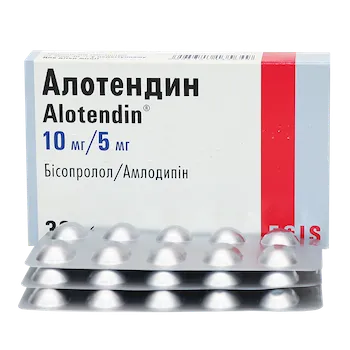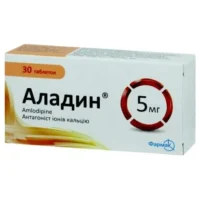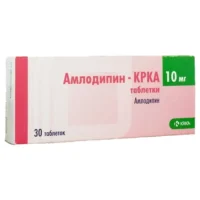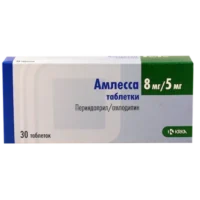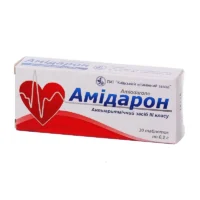Description
Alotendin (Bisoprolol) Tablets 10/5 mg. №30
Ingredients:
Each tablet contains 10mg of bisoprolol fumarate and 5mg of bisoprolol hemifumarate.
Mechanism of Action:
Bisoprolol, the active ingredient in Alotendin, is a selective beta-blocker that works by blocking the action of certain natural substances in the body, such as epinephrine, on the heart and blood vessels. This results in a lowering of heart rate, blood pressure, and strain on the heart, which can improve symptoms and outcomes in various cardiovascular conditions.
Pharmacological Properties:
Bisoprolol exerts its effects by selectively blocking beta-1 adrenergic receptors, leading to decreased cardiac output and reduced sympathetic activity, thereby lowering blood pressure and relieving angina symptoms.
Indications for Use:
Alotendin tablets are indicated for the treatment of hypertension, angina pectoris, and heart failure.
Contraindications:
Do not use Alotendin if you have a known hypersensitivity to bisoprolol or any other component of the formulation. Patients with certain heart conditions or severe circulation problems may also be contraindicated.
Side Effects:
Common side effects of Alotendin may include fatigue, dizziness, bradycardia, and gastrointestinal disturbances. In rare cases, it may lead to bronchospasm or worsening heart failure symptoms.
Usage Instructions:
The recommended dosage is one tablet daily, to be taken orally with a glass of water, with or without food. Dosage adjustments should be made under medical supervision.
Benefits Compared to Analogues:
Alotendin offers the advantage of once-daily dosing, convenient administration, and proven efficacy in the management of hypertension, angina, and heart failure compared to other beta-blockers.
Suitable Patient Groups:
Alotendin is suitable for adult patients with hypertension, angina, or heart failure. Dosage adjustments may be necessary for elderly patients or those with impaired renal function.
Storage Conditions and Shelf Life:
Store Alotendin tablets in a cool, dry place away from direct sunlight. Check the expiration date on the packaging and do not use the product if expired.
Packaging Description:
Each package of Alotendin contains 30 tablets of 10/5 mg strength, sealed for protection and labeled with dosage instructions and expiry date.
Scientific Evidence:
Several clinical trials have demonstrated the efficacy of bisoprolol in the management of hypertension, angina, and heart failure. For example, the CIBIS III trial showed that bisoprolol reduced mortality and hospital admissions in patients with heart failure, highlighting its importance in the treatment of this condition.
Additional Information:
It is important to regularly monitor blood pressure and heart rate while taking Alotendin to ensure optimal treatment outcomes. Additionally, abrupt discontinuation of bisoprolol therapy should be avoided to prevent rebound hypertension or worsening of heart conditions. Consult your healthcare provider for personalized advice on the use of Alotendin and to discuss any potential drug interactions or side effects that may occur.

